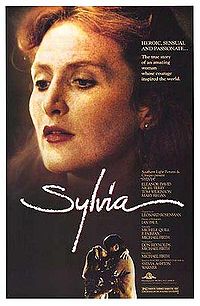
SYLVIA
New Zealand, 1985, 95 minutes, Colour.
Eleanor David, Nigel Terry, Tom Wilkinson, Mary Regan, Martyn Sanderson.
Directed by Michael Firth.
Sylvia is a portrait of the New Zealand educationalist and novelist Sylvia Ashton Warner. Born in 1908, she died in 1984 just before this film was made.
The film opens with some interview material with Sylvia Ashton Warner, her reminiscences about her breakdown, her drive, destructive forces, education. During the 1940s she pioneered methods of educating Maori children to read, not by the traditional methods, but by associating words that they liked with drawings, getting them to write their own stories. She was not appreciated by the powers-that-be in Wellington. In fact, she was more welcomed overseas than in New Zealand in the ensuing decades.
She also began to write – and a film was made based on her novel The Spinster with Shirley Mac Laine and Laurence Harvey in 1961.
This film is based on her book Teacher, about her methods, and another book I Passed This Way.
British actress Eleanor David is quite moving in the central role, a strong woman who has experienced breakdown, a creative woman. Her husband is played by Tom Wilkinson (ten years before Priest and twelve years before The Full Monty which led him to a very strong international career). Nigel Terry is Aiden Morris, the inspector. New Zealand actress Mary Regan is the district nurse.
The film was directed by Michael Firth who made a number of films, including Heart of the Stag, in the mid-80s in New Zealand.
This is a very interesting film on methods of education, a re-creation of the 1940s, a focus on the isolation of New Zealand and a focus on developments with the Maoris in New Zealand.
1.Sylvia Ashton Warner, her personality, her work, writing, educational methods, reputation? The credits and the interviews with her?
2.New Zealand in the 1940s, the remote town, the house, the school, the pub? The shed? The attention to detail and re-creation of the period? The scenes in Wellington and in the offices?
3.A film about language, issues of spelling, the alphabet, learning the alphabet, singing the alphabet song? Personal words, choices of words? The Maori language? Words not being destructive, but traditional methods getting children to feel self-conscious, rebel? Her methods getting them to eventually read in the mainstream?
4.A film of music, the piano, Sylvia playing, the children spontaneously dancing, the alphabet song, singing for the inspectors, Sylvia going to the recital in Wellington? The background musical score – piano?
5.The background interviews, her breakdown, her marriage to Keith, the three children, the opening memories of her hospitalisation? On the bus, travelling to the town, the distant welcome from the townspeople, walking to the house, the isolation, setting up the house? Sylvia and her parcels from her sister in Wellington – the touch of civilisation? The school, Keith and his work, her inability to keep discipline, the introduction to the school by the army man and his strict discipline? Her interactions with the children, her lack of control? Playing the piano? Inspector Gulland and his pep talk on her taking the job, his trust in her? Her managing, not managing? With her own children?
6.The issue whether she was a teacher or not, her drawings, playing the piano? The children and their discovery of words and word association? Her paintings on the wall, the events and her transferring them to pictures? Taking them out into nature? The bonds with the children? Getting them to write their stories, the reading them out to the unimpressed inspectors? Her explanation of the drawings and their anger at her as authority? Aiden Morris and his inspection, his not being pleased, his response to the alphabet song? His return, calling in to see her, his support? Staying the night, the rugby match, going to the picnic – and the kiss during the rain? Taking her manuscripts to Wellington? Her visit to Wellington, seeing him with his wife? The inspectors, their disdain, their brush-off? Their giving her nil for her assessment?
7.Opal, a friend, the district nurse, talking and sharing, the sculpture, Opal and the stress about her not being married because of the war, the deaths and her inability to save lives? The outings, the picnic? Opal in herself, her work? Her stories?
8.Keith as a person, his love for his wife, supportive of her, the children? The headmaster of the small school, his liking to be in charge, wanting eventually to be a headmaster in the city? Hard work? Letting Sylvia have the shack, helping her paint it? His friendship with Aiden, the inspection, the rugby match, the picnic? His hopes?
9.The people of the town, in the pub, the experience of the war, the patriotism for Mother England, the films in the school, the racist outburst in the pub?
10.The children, the Maoris, their inability to learn, the western ways, the development through Sylvia and her encouragement, the farewell – and their being subjected to rote times tables?
11.Education, the bureaucracy, the cups of tea, the lack of imagination, authoritarian?
12.Sylvia, her change, the infatuation with Aiden, love for her husband, the bonds with Opal and being able to share with her, the children, her creativity?
13.Audiences seeing the foundation for her methods, her explanations of her creativity and how she understood the children? The information and the aftermath of her career?